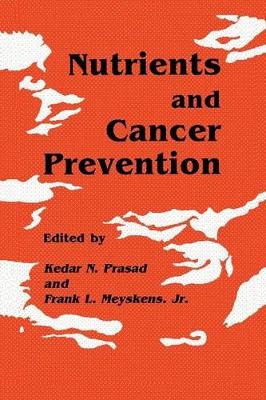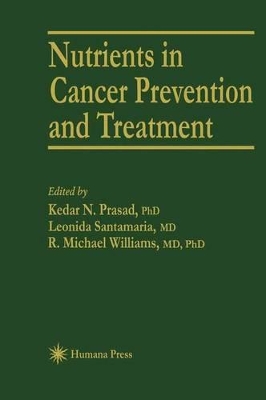Experimental Biology and Medicine
2 primary works
Book 23
Nutrients and Cancer Prevention
by Kedar N. Prasad and Frank L Meyskens, Jr
Published 4 October 2011
During the last 10 years, the role of specific nutrients in cancer prevention and cancer treatment has been the subject of intense basic, preclinical, and clinical research. At present, the major focus of nutri tional oncology is on the mechanisms of carcinogenesis and their modification by nutrients and on cancer prevention studies in animals and humans. Some human epidemiological studies have confirmed the hypothesis, developed on animals, that there is an inverse relation ship between the intake and/or level of !3-carotene, vitamin A vita min E, or vitamin C and the risk of cancer, whereas others have shown no such relationship. This is not unexpected, since the protective effect of individual nutrients may be too small to be detected by epidemiological methodologies in which a single vitamin or mineral is considered as one variable. Conclusive evidence regarding the role of nutrients in human cancer prevention will come from a well designed human intervention study using one or more nutrients in a population that has a high risk of developing cancer. The involvement of specific nutrients in the regulation of protooncogene expression has just begun. Also, some of the results of human intervention trials are beginning to yield interesting results. A large number of interna tional scientists from various disciplines, including cell biology, mo lecular biology, nutritional oncology, epidemiology, and public health, reviewed and discussed their most recent findings. The following topics were emphasized: 1. Mechanisms of carcinogenesis; 2.
Book 27
Nutrients in Cancer Prevention and Treatment
by Kedar N. Prasad, Leonida Santamaria, and R. Michael Williams
Published 5 December 2012
Nutrients in Cancer Prevention and Treatment contains articles that were presented by leading researchers and physicians in the field of nutritional oncology. Most of the previous conference proceedings on Nutrition and Cancer have dealt primarily with the issue of the role of nutrients in cancer prevention. This is logical because enormous quantities of laboratory and epi demiologic data have been published on the topic. Nutrients in Cancer Prevention and Treatment also contains several studies on the role of diet and vitamins in cancer treat ment. There are very few books that have reviewed laboratory and clinical studies and the role of vitamins in cancer treatment. There are preliminary data suggesting that daily supplementa tion with high doses of certain vitamins in combination with conventional therapeutic agents may enhance their growth inhibitory effects on tumor cells, and may protect normal tissues against some of their toxic effects. This book is unique in the sense that several articles have discussed the mechanisms of action of individual vitamins on cellular and molecular parameters. It is very exciting to note that some of the vitamins inhibit protein kinase C activity, increase the production of certain growth factors, and modulate the expression of a number of oncogenes. These studies, at least in part, offer rationales for the cancer protective effects of vitamins.

